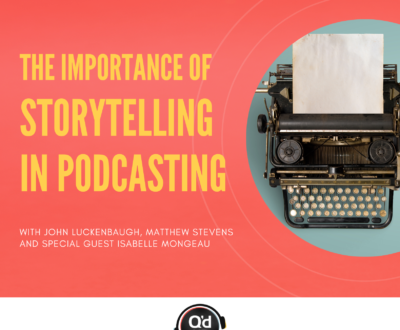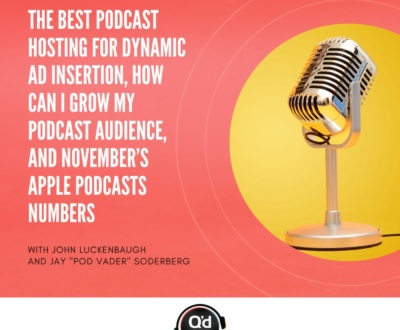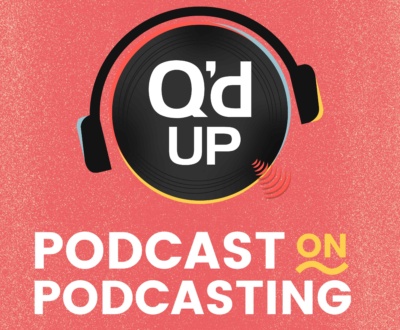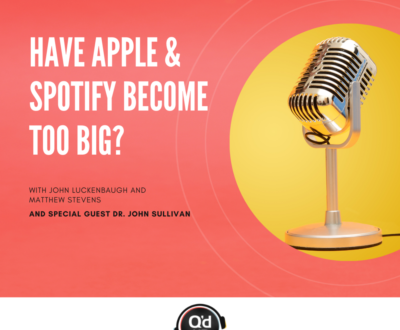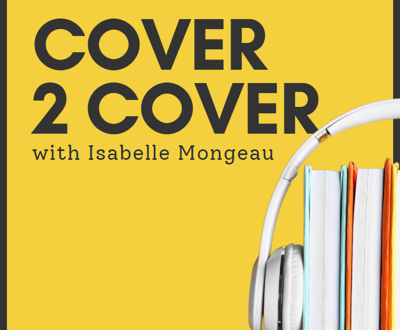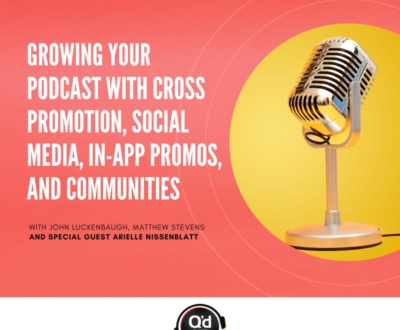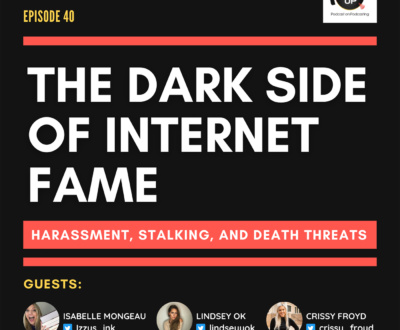
If you’re a podcaster, chances are you have hosted or will be hosting an interview. While it may sound as simple as having a conversation and pressing record, there is a lot more to keep in mind to make sure your interview is engaging and doesn’t flop.
What steps can you take then? On this episode of the Q’d Up Podcast on Podcasting, Isabelle Mongeau joins John and Matt to discuss how to pick a guest, the importance of the pre-interview process, creating engaging questions, how to successfully record the whole interview, and much much more.
Listen as Matt, John and Izzy discuss hosting an interview.
Introduction (0:28)
Catch up with Matt and John as they chat about some quick life updates.
Feel Connected Through Podcasting (1:12)
One of the incredible things about the podcasting medium is the intimacy that it provides. Oftentimes, interview podcasting tends to be one of the more intimate forms of podcasting. Celebrity interview podcasts are popular now, but are not the only interview podcasts that are incredibly engaging. So how do you become a better interviewer?
Introducing Izzy (2:24)
Q’d Up Team Member and Head of Script Writing, Isabelle Mongeau, joins Matt and John on this episode of the Q’d Up Podcast on Podcasting.
John, Matt and Izzy hit the ground running by discussing their pet peeves when it comes to podcast hosting. From interrupting and over-talking, to being unprepared, and editing the show poorly, the hosts share things they recommend avoiding when podcasting. Consider diving deep into your topics and making sure you are educated about your guest to avoid these pet peeves. Using visual cues to communicate non-verbally with your guest keeps engaging conversations without unnecessary “mm-hmms” and “uh-huhs.”
The Art of Entertaining (6:49)
What keeps something entertaining? Izzy’s short answer: stories. Tell the stories of your guest and let their story unfold through the interview process.
Simple tips for better interviews.
- Choose a topic that you and your guests are interested in. This lets your passion shine through. The audience can sense this through your delivery.
- Charisma. If your guest has charisma, the audience will likely be more interested. Some people interview better than others, and understanding that is important.
- Be knowledgeable. Your audience and your guest can tell if you do not know what you are talking about. So be informed or, at least, do your research.
- Being niche is GREAT. Taking a small fact or story and running with that can lead to great discussions and trust with your guest.
Get to Know Your Guest (11:38)
You are ready to research your guest; where do you look? It depends on the industry. Across the board, looking into your guest’s social media can be a great tool. Turn to Twitter, Instagram and Facebook. LinkedIn can be great for business and science fields. You have to dig deep though. Scroll way back and see what you find. This can help you delve into conversations of their past, since you have a small glimpse of it.
Stand out by asking questions outside of the span of the last six months. By expanding beyond the near past, your guest will be engaged and likely be excited to discuss non-repetitive questions.
Learn from Other’s Mistakes (14:10)
If your guest has other media appearances, go watch or listen. This may prompt follow up questions you want to ask. You can learn which questions to avoid, or which to dive further into. Even watching a compilation of bad interviews can teach you what NOT to do.
Structuring Questions (17:09)
Avoid questions that can be answered with a ‘yes’ or ‘no.’ The ‘why’ and’ how’ questions can evoke more emotion and provide more room for answers. Your guest will be reflecting more and you will likely get better answers.
Being flexible with your questions is also essential. You can have a question list, but be prepared to step outside of that. Work with the conversation and ask probing questions where they arise. Remember, you want to keep your guest comfortable and reading from a cue card can make things rigid.
Over-preparing questions is far better than under-preparing. You don’t need hundreds, but you should have ⅓ or ½ of questions leftover after the interview. Grouping and organizing questions is a great way to help your interview.
Pre-Interview Process (24:34)
Logistically, there are a few things to take care of. Get permission to record, ask questions and release the audio on record. Reiterate with the guest that they should let you know if there is anything they want taken out of the interview. This will cover your bases.
Prepare your guest, as well. Make sure they know what you are going to be talking about so they can research and refresh as necessary. Asking your guest if they are willing to share and promote the podcast is important. Thank you guests for their time. A little thanks goes a long way. Fill your guest in on where and how the podcast will be shared – don’t leave them in the dark.
Keep the Conversation Flowing (28:40)
A 30 minute podcast can feel daunting. How do you keep your guest engaged and pull them back in if things slip away. Internally, stay on track and don’t be afraid to move on when you need to segue. Be sure to acknowledge the end of a segment.
Transition creatively. Saying “for my next question” can come across as lazy podcasting if you overuse it.
Evaluate and Evolve (33:09)
Listen to your own interviews to identify things you may want to change. This will allow you to look back and see your growth. Find interviewers you admire and learn from them. Izzy and Matt share some of their favorite interviewers and why.
Leave the Judgement at the Door (37:23)
Your guest is there to share with you. So judging them will only make your guest uncomfortable and unwilling to share. Don’t accuse them or make them feel bad. Actively listening can help your guest feel comfortable and open up. Ask your questions with honesty, but without judgment. Pick up on your guest’s cues and tune in to your emotional intelligence to know when to move on from a topic.
Back to the Basics (42:16)
It may sound simple, but at all times, you should be considering the who, what, why, when and where. Then, think in the past, present and future. Use this structure to help guide your conversation. Try this next time you are interviewing and watch the new question possibilities that open up (but be sure to ask them one at a time). Using this structure can help the storytelling and keep your listeners engaged.
Test your Tech (46:38)
What good is an interview if no one can hear it? Good equipment is essential. If your guest is not with you, have them call in. Computer mics can pick up a lot of background noise. Consider recording extra tracks and utilizing a visual cue.
Some recording tips to keep in mind:
1) Sound check to test the sound environment.
2) Get your guest on the phone. The phone receiver has a more direct signal. Pairing this with a dial-in program can give you great sound.
3) Make sure you have levels and can hear the guest in your headphones. If you can not hear the guest, they are not recording.
4) Record separate channels for each speaker. This lets you edit out individuals’ excess noise.
5) Record a backup if you can. It can’t hurt to be careful.
Using these tips can ensure that your great interview translates well into your listener’s ears.
Follow Q’d Up:
Request a free quote
We offer high-quality production, distribution, and marketing for podcasts and audiobooks. Contact us today for a free, no obligation quote

